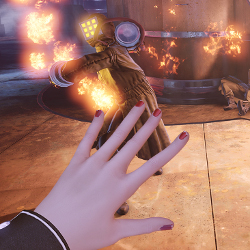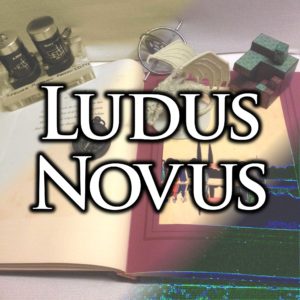I first played Minecraft in 2009 back when it was an Infiniminer clone being developed on the Tigsource forums. It was immediately clear to a bunch of people that it was something special but no one could have guessed what the game would become in just a few years. It may be the most popular game of all time. It’s definitely the most popular game among kids right now. Odd, then, that most of the Minecraft experience is about not playing Minecraft.
All posts by Gregory Avery-Weir
Ossuary Now on Steam
Ossuary is on Steam! It’s been a long road getting there, but a game I wrote and designed is finally on the largest online game store.
So far the game’s been selling well compared to its previous performance, but it’s not been anything lifechanging. I’m very thankful to all the fans and journalists who have helped us get to this point.
If you haven’t played the game, pick it up on Steam! If you have played the game, you should have a Steam key waiting wherever you bought it. Please leave a review on the Steam store page saying what you thought!
Ossuary occupies a complicated head space for me. It was developed during a very difficult couple of years in my personal life, and it’s releasing right when I’m struggling the most to support myself. I hope that in the years to come I can look back on this release fondly, but right now I’m not quite sure how I feel.
Discordianism is a major influence on Ossuary, and I’m reminded of its Parable of the Bitter Tea. The Parable of the Bitter Tea teaches us to accept the nature of things. You can work to improve the world and you can see the flaws in it, but it’s harmful to struggle to change that which is already set in stone. I’ll work to be mindful of how I am right now and move toward the future.
Everyone Should Watch “Alone Together”
 “Alone Together” should be shown in schools. This episode of Cartoon Network’s Steven Universe is the best exploration and communication of childhood intimacy and active consent that I’ve ever seen. Katie Mitroff, Hilary Florido, and Rebecca Sugar have crafted a story that does what science fiction does best: explore big concepts through powerful metaphor.
“Alone Together” should be shown in schools. This episode of Cartoon Network’s Steven Universe is the best exploration and communication of childhood intimacy and active consent that I’ve ever seen. Katie Mitroff, Hilary Florido, and Rebecca Sugar have crafted a story that does what science fiction does best: explore big concepts through powerful metaphor.
Everyone should watch this episode.
“Alone Together” teaches that intimate relationships are built on trust and mutuality, that intimacy requires active and ongoing mutual consent, and that while intimate acts are important and can be life-changing, they don’t mean the loss of something unrecoverable. It teaches all this through the metaphor of dance, a form of intimacy that is accessible and safe for young people.
I’ll explore the story of this episode, discussing its ending as well as the unexpected character backstory revealed in “Jail Break.”
Continue reading Everyone Should Watch “Alone Together”
Drowning a Deity – Bioshock Infinite: Burial At Sea Episode 2
This post was requested by a patron. To support writing like this and request your own post, sign up on my Patreon page.

The Bioshock series is about power and history. Power from flesh and history transformed. I’ve explored its biopunk underpinnings before, but I haven’t explored the most recent and oroborosian entry in the series: Bioshock Infinite: Burial at Sea Episode 2. It strips the wings from a deity in the service of motivating events in the first game that didn’t need justification, but in the process it introduces some interesting stealth elements in a game not originally built for them.
Continue reading Drowning a Deity – Bioshock Infinite: Burial At Sea Episode 2
Orcs Must Die: Blocking Strategies
This post was requested by a patron. To support writing like this and request your own post, sign up on my Patreon page.

I have a confession: I’m a turtler. And Orcs Must Die 2 doesn’t want me to be.
The game I think of when I read “tower defense” is “Desktop Tower Defense.” It’s my mental archetype of that form, which arose from mods for Starcraft and Warcraft III: a game about preventing waves of invading enemies, or “creeps,” from reaching the exit of a map using stationary towers that attack when the creeps come into range; these towers are built with a budget you earn by killing creeps.
The strategy for “Desktop TD” is primarily about crafting a path for the creeps, one which is circuitous as possible. The towers in “Desktop TD” are solid, so they block creeps, making your towers also serve as your maze. Mastering “Desktop TD,” therefore, requires you to craft a perfect maze, a gleaming labyrinth made from the cheapest towers with just enough addition of special tower types and more powerful, upgraded towers.
Some tower defense games, like “Desktop TD’s” contemporary “Flash Elements TD” have a simpler approach where the creep paths are static and unobstructable. Towers can only be placed in the spaces around the path. I find this approach less interesting, as it allows for less creativity and diversity of play. The most a player can do to affect the process of the creeps, beyond killing them, is by slowing them, often with a tower themed around ice or viscous fluid. Orcs Must Die and the other games I’ll discuss here owe more to the “Desktop TD” style.
The Orcs Must Die series by Robot Entertainment belongs to a subfamily of tower defense games, probably birthed by Sanctum. These tower defense hybrids add a mobile player character with weapons that can supplement the stationary towers. In the case of the Orcs series, the player character is a martial wizard defending a fantasy world against hordes of orcs and other creatures. But unlike Sanctum, its differences go beyond just letting you help your towers with their work.
How to Fix D&D 4e Combat
If you like this blog post, you can help support my writing by pledging a small monthly donation in exchange for exclusive content on my Patreon page.
I’ve been running a Dungeons and Dragons fourth edition campaign for going on five years, and it feels like we’ve finally figured out how to fix the combat system. D&D 4e is intensely tactical, more so than any other edition, and I find the grid-focused combat quite fun, but it suffers from some severe problems. The biggest of these for us is that combats stretch on too long without enough excitement. Here’s how to solve that.
Ludus Novus 024: Decision Point

This podcast is supported in part by my Patreon. You can help support it by pledging a monthly donation.
In this episode of the Ludus Novus podcast, I discuss the decisions we make as game designers and developers and how we are responsible for every aspect of the games we make. I touch on polishing, social justice, and emergent aspects of games.
Continue reading Ludus Novus 024: Decision Point
Support Me On Patreon
 I’ve set up a Patreon page. If you want to help support the work I do or want to repay me for joy I’ve brought you in the past, you can sign up to give a monthly donation.
I’ve set up a Patreon page. If you want to help support the work I do or want to repay me for joy I’ve brought you in the past, you can sign up to give a monthly donation.
Continue reading Support Me On Patreon
Ludus Novus 023: Searching

In this episode of the Ludus Novus podcast, I discuss the search for the perfect game and the creation of universes.
[display_podcast]
When I search through my Steam library and I look for that game, that perfect game, the perfect experience that matches the mood that I am in right that moment, I’m playing a game with the entirety of my library: the entirety of games as a medium.
The music for this episode is “Progress” by mystified from the album Fractal Diner 3. It’s available under a ccby2.5 license.
Let me know what you think in the comments.
Ossuary is Coming to Steam
Our unsettling dialogue-focused adventure game Ossuary is coming to Steam. The torturous Greenlight process is over, a bit mysteriously, and now we’ve started the work of preparing all the material we’ll need to be released on the largest video game storefront around.
I’m prone to a sort of postpartum depression around game projects. When I release a new game or finish a major milestone, I often have a flare-up of my chronic depression and find it very hard to motivate and care for myself. I’m definitely experiencing that right now: the Greenlight process for Ossuary took so long and occupied enough emotional space in my brain that its resolution leaves me feeling a bit bereft. I’m managing it pretty well, but it seems ironic that a success, or at least a big step of progress, has brought me so low.
The circumstances around the final approval are weird, but that’s a post for another day.